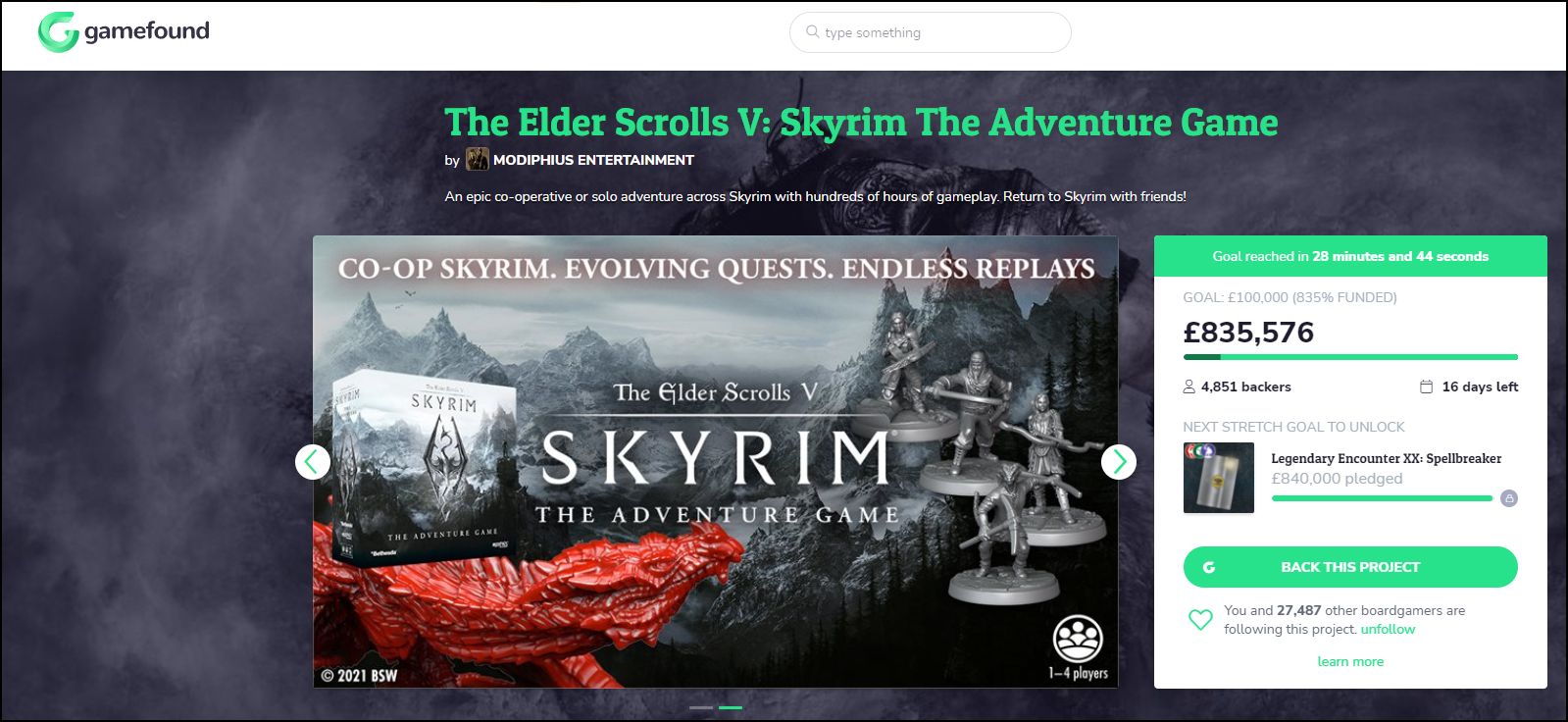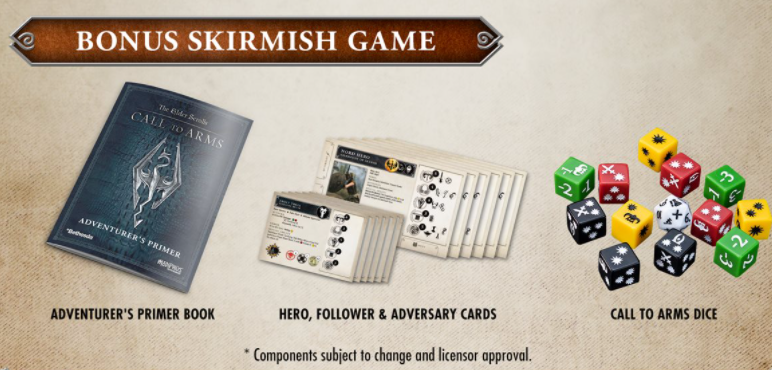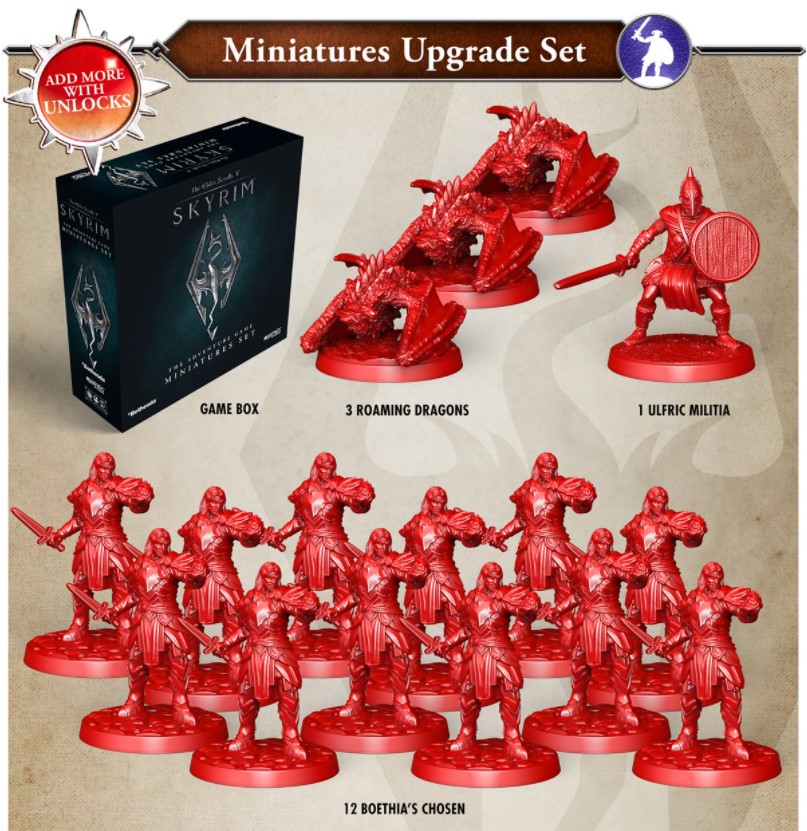Yesterday’s post contains Part One of the interview with Chris Birch of Modiphius Games and Juan Echenique, one of the designers of The Elder Scrolls V: Skyrim the Adventure Board Game. Today we conclude the interview; tomorrow I will share my thoughts on the game and why I’ve decided to back it.
Just some reminders: (1) Skyrim refers to the Elder Scrolls V videogame whereas Skyrim:TAG is the Modiphius tabletop version; (2) all in-game graphics are provided courtesy of Modiphius Entertainment; (3) the interview has been slightly edited from the audio transcript for readability; (4) I’ve inserted some post-interview clarifications and comments in square brackets [like this].
And now, back to the interview:
David: Okay. Would you like to expand a little more in detail about how COVID and the shipping crisis has affected calculations?
Chris: There was huge shortage of shipping containers. One of the reasons is there’s 10,000 shipping containers with PPE equipment that the [British] government’s bought that they can’t use.
You’ve also got the shipping companies, who also run the cruise lines and they’ve lost a fortune. So they’re trying to keep some of the money. Plus there’s all sorts of delays at the ports. You’ve got Brexit. You’ve also got big, big, big delays in the American ports. There’s a hundred ships right now sitting outside the port of LA when there should be. like, a dozen.
There’s a shortage of lorry [that’s British for “truck”] drivers in America. There has been for years. And as a result, they can’t get enough lorries into the port to take the containers out. You’ve got containers being stacked on top of other containers. A container may have come in a month ago, but it’s now at the bottom of a pile. So when they load up trains and lorries at the port, those containers get loaded on last. They’re so backed up and then you’ve got the problem that the railways got really degraded in the eighties, I mean, there’s a whole political story here.
David: Margaret Thatcher.
Chris: Yeah. And you’ve got a lot fewer big rail depots in America than the equivalent in Europe. So for example, Chicago’s a big depot and they will say: “Don’t come here, we’ve got no space.” So the lorry carrying your games has to go further ’round to another depot. Basically, there’s delays everywhere.
Britain’s also got Brexit delays in the ports. Sometimes ships won’t even dock because there’s no room. And so your container goes off to another country. There are massive, massive logistics problems. A container holding 3,000-5,000 big-box games like Ticket to Ride that you need to get from China to say the UK or America used to cost about $6,000 per container. A recent quote for the same container was $32,000. And actually the 32,000 is “dry” [ie, just the starting cost] because there’s various other costs like insurance and so on. So just imagine what that does to someone’s bottom line. You don’t make a lot of money on board games often. Before it was $6,000 divided by 4,000 games which was $1.50 shipping cost per box. So you budgeted for that.
But now it’s more like $36,000 divided by 4,000 and suddenly you’ve got to budget $9 a box and probably the game costs you $9 to make in the first place so you’re basically losing all your margin. Typically, if you’ve made a game for $9, you might be selling it to trade at least for $18. The increase in container costs have wiped out all your margin. You’re not making any money. There are Kickstarter projects right now having to burn the games in China because they will lose money. If they ship them, they literally will lose money on every copy.
Which for small publishers means they might lose their house. They will lose their business and, and it’s not worth it. It’s better to tell backers: “We’re really sorry. This is a disaster, we can’t keep the stock, but it’s costing us a fortune to keep it every day in a warehouse in China waiting for a boat. And the factories don’t have the room, either.”

David: I’ve only got a couple of other questions left about the campaign. One is, why are you using Gamefound and not Kickstarter? I personally applaud that decision actually. I have friends who are publishers and they’re very frustrated with Kickstarter for many reasons. But one of my gamer friends said to me, “The Skyrim thing is on Gamefound? That’s a red flag right there.”
Chris: The simple thing is Kickstarter is massive, but it has a brand name for crowdfunding and it has some connotations with it for Bethesda
David: Interesting. What connotations does Kickstarter have for Bethesda?
Chris: Well, they don’t really want their prime brands on a crowdfunding platform. Whereas, while Gamefound is a recognizable crowdfunding name…
David: It’s more of a boutique brand.
Chris: Yes. So it dials that pressure back. And also we were coming at this from a point of view of not unlocking another five boxes of stuff. We’re not delaying this project for another two years so we can add crazy stuff into the box. There are some really cool cards and a few extra bits and pieces, extra miniatures that we’ve unlocked, but it’s stuff for the existing boxes and we’re going to production in December.
So for us this campaign is really a very elaborate pre-order. I mean, Kickstarters are pre-orders at the end of the day– certainly for the us bigger companies, you know, CMON and us and Awaken Realms. We’re making the game, it’s going to go to retail. It’s going to do very well.

And really we’re using this campaign to decide how many copies we should produce. Should we make 20,000? 50,000? 80,000? [I wanted to ask how exactly they went about this but we never came back to this point and I regret that.] And, and of course you want to unlock a load of cool stuff. We’ve also received a lot of feedback from the community in the last week since we launched. We’ve created these Legendary Items because, the backers said, “We don’t really feel the base game is worthwhile enough.” So we said, “Okay, we’re going to put this extra stuff in.” There’s some really clever ideas that people had and people are going to see some news about that. We’ve got some really good stuff coming through that has been influenced by backers. So backers are having that impact, but it’s not crowdfunding in the sense that: “Well, if we don’t get enough money we won’t make the game.”
That 100,000 [British] pound funding figure was really to recover our development costs that we’ve invested over the last three years and the kind of upfront tooling and stuff. It was an arbitrary number.
David: But you’re promising delivery next August, which is really not that far away.
Chris: What we’re not doing is: “Oh, it’s a really good idea to make 10 big plastic dragons.” Sorry, guys, that’s going to take another a year of sculpting. What we’d rather do is draw a line and say to ourselves: “Wow, people love this so much. Let’s do another crowdfunding project in a year’s time and we’ll do something else then.” And all those really good ideas will go into that project.
My big goal is to deliver this game when we said we deliver it. And we’ve allowed some time for all those crazy freight delays.
We are going through some final tweaks, we’ve been upgrading the end game art we’ve managed to get much higher resolution, some better scenes. We’ve been doing some tweaks to designs to make them more colorblind friendly. We’ve been making some of the icons more readable. And then some of these new cards are dropping in.
But we’re still aiming to go to production in December and production is multi-stage. They’ll start on the base game and then they’ll start the Dawnguard [Expansion]. So the goal is to get all the production going started in December when we’ve already been getting most of the tooling done. We’ve seen plastic samples of the figures and approved them for the actual metal tools to be made. And we’ve allowed, a good couple of months for delays in that and we’ve allowed a longer period for shipping.
Goodness knows what will happen next year. God forbid there’s not another resurgence.

David: We’ve covered a lot, but I wonder if you want to talk about what is this introductory skirmish game that’s been unlocked in the Stretch Goals? Is that basically the Call to Arms game, but at a simpler level that people who get Skyrim:TAG can then do with what they get in the Skyrim box?
Juan: It’s a, a shorter, more friendlier, easier, easier-to-learn version of Call to Arms. You can it play a lot, but if you like that style, well, then go to Call to Arms.
Chris: We decided to add it as a free bonus with the miniatures upgrade set, which has, I think, 58 minis now. So you basically get a box of cool upgrades for the board game, but you also get a free, cool battle game you can play with friends and everything in it is compatible with the war game. So of course we’re hoping that people say: “This is fun. I want more of this,” and then go and start buying Call to Arms stuff.
David: Is there anything else you’ve learned from the Siege of the Citadel campaign? Because that’s another thing I’ve seen in the comments that specifically namecheck that as a reason not to back Skyrim:TAG.
Chris: We’ve had lots of delays in our projects. I mean, I think everyone’s had delays. Siege was a good example of something very delayed because we got too carried away with all the cool ideas and adding more stuff in so development took longer as a result. I mean, there were also all sorts of issues with the plastics. And we’ve been working our way through everyone who’s had an issue with mold. [Many backers reported very moldy smells and components in their Siege of the Citadel expansion boxes, which arrived in some cases years after the base game.]
In Siege it looks like two or three pallets got damp in the factory. The base games were sitting there for about 18 months because we actually shipped the first wave of shipping like two years ago. And then it was over the last year that we’ve shipped everything out. And there was a big gap, especially with COVID as well. So some people had a little bit of mold and they were like, just give us a credit. It’s fine. And in other cases people were dissatisfied and we said, “We’ll send you a new game,” and it was fine. So we worked our way through that and there’s replacements we’re still waiting on; the container they’re in is delayed coming from China. It should be here at the end of November finally, and all the last little replacement missing parts will go out the door then.
But yeah, we learned our lesson: get everything done before the launch. We learned our lesson about getting the tooling done, getting all the plastics for the minis. Adjust every plastic figure so that it fits in the mold in the right way so that the engineering goes smoothly. And that that work takes a month or two. For Skyrim: TAG that’s all been done. We’ve already started the actual work of the metal tools.
And we wanted to make sure that there was really nothing that is going to delay us another three months. Because that was unacceptable. We wanted to be able to get this out next year and follow through.
There are certain things that are out of your hand, like: people can be ill on the team and you just can’t get something finished. The production can slow down and there can be problems with the warehouses, like mold or containers going astray and being two months late, three months late, which lots of people are experiencing at the moment.
We’ve tried as much as possible to reduce any chance of delay as much as is in our control. We had a meeting the other day about other stuff that we could do, you know, any sort of small stretch goals and stuff. Anything that was: “Will that delay us by a month?” was off the table because while I’m sure a lot of backers would love if we started adding all kinds of crazy stuff–

David: I’ve seen so many requests about minis. I saw people asking for different poses and it’s like, oh my God–
Chris: Sure, it seems like a good idea. But for gameplay actually when you have multiple different Wandering Monsters on the board, you’re going to want them all to be the same. [I heartily agree, by the way.]
We’re trying to stick to the lessons we’ve learned, and then when you have problems with shipping, there’s no spare money to pay for those extra costs. And we’ve allowed for the crazy amounts of shipping. I mean, if it gets worse than that, we’ll be having bigger problems than trying to deliver board games. [Like the collapse of civilization.]
I don’t think any company gets big enough that you can never have problems. Even big companies struggle because the problems just get bigger. They don’t go away. The result of a problem going wrong is even bigger because of the size of the project. Something that costs a dollar more per copy when you have 10,000, 20,000 games just cost you $10,000 or $20,000, not the few hundred dollars it would be for a small project.
David: So the last question really is for you, Juan, because you’ve been with this project for three years, it’s been a very long pregnancy. For gamers out there who may already have Gloomhaven, or some of the other big adventure games. What’s your pitch to gamers out there? Why they would want to buy Skyrim:TAG? Whether they’ve played Skyrim or not, why should they buy this game? What is it about this game that makes it special to you?
Juan: Well, first it’s a grand epic adventure that can you can spend a lot of very enjoyable hours in. But there’s an element that has been there since the very first draft of the game, what we consider the true goal in this game. It’s that you don’t want to put it down. You don’t want to stop playing. It’s very hard to finish the day.
When we were still at the office, working with the prototypes, when our time came to go home, it was very hard to go home because we wanted to keep on playing all the time. Even when the game was over, we still wanted to keep on playing. And the interesting thing here is that the eyes of the players were not looking down, focusing on something in front of them. They were looking at each other, at their colleagues. So it’s a shared experience where you want to keep on playing with people. You get to know people around you in a very positive way. It’s a very enrichening and very fascinating, shared experience. It’s narrative and it takes you to a different world with your friends and with people you don’t know, they become your friends as you play. That’s very cool. We have been playing with reviewers, and at the end of the day, we always feel like there has been a very important shared experience; we want to go have a drink with them. We want to be their friends and they have the same feeling.
That doesn’t happen with all games. It hasn’t happened with all the games I’ve worked on. I wish it had happened more, but with Skyrim:TAG it has been happening since the first version. And that’s the goal for us. That something special happens when you play this, and it’s shared between people.
David: Well, that’s a fantastic way to wrap it up, I think! Thank you both.
Tomorrow, my thoughts on Skyrim:TAG.
[…] new content for Keyforge as well as all new Ravensburger product. To compound this, as we found out in our interview with Modiphius Games founder Chris Birch last month, infrastructure problems in the US have just […]